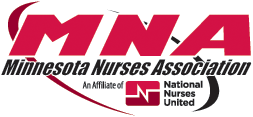By Laura Sayles

MNA Government Affairs Specialist
MNA Government Affairs Specialist
Just a day after the 2018 Session ended, it’s still hard to know the final outcome of Session. The Governor has 14 days to decide whether to sign or veto a variety of bills: the omnibus budget bill, a second tax bill that also contains some money for school safety, the bonding bill, and the pension bill are among those that are waiting for Dayton to take action.
While it may feel like a lot of legislating takes place behind closed doors and late at night, we already know that the voices of the citizens of Minnesota made a difference in ensuring that the Interstate Nurse Licensure Compact and the Medicaid Work Requirements bill did not pass this Session.
The Minnesota Nurses Association has long opposed the Interstate Nurse Licensure Compact. Under the Nurse Compact, Minnesota hospitals would be staffed with out-of-state nurses who were not trained in Minnesota or issued a nursing license from our state. Allowing Compact nurses to work in Minnesota hospitals would require them to either ‘get up to speed’ on Minnesota’s high standards of patient care procedures or require Minnesota nurses to constantly monitor and correct them to ensure patients are safely and properly cared for. In the interim, patients are at risk.
MNA members sent more than 1000 emails to their elected representatives and the Governor this year. Through our Mini-Day on the Hill program, we had 25 nurses who made about 45 in-person visits to make the case for why legislators should oppose the Compact bill. We also had several nurses testify in committee about our concerns with the bill. Their persistence and activism paid off.
The Medicaid Work Requirements bill is an example of the power of the collective action of a coalition. These bills would require beneficiaries to verify their participation in approved activities, such as employment, job search, or job training programs (for a certain number of hours per week) in order to receive health coverage through Medicaid.
A coalition of more than 150 Minnesota organizations came together to ensure that this bill would not become law in Minnesota. Through Twitter, Facebook, email and a cadre of professional and citizen lobbyists, members of this coalition were able to speak with every Representative and Senator; and in some very important cases, they were able to convince a few legislators of the cost, complexity, and unintended consequences of this proposal.
Much like the power of collective action that is at the heart of the union movement, the power of collective voices and coalitions can come together to accomplish good things for Minnesota.


